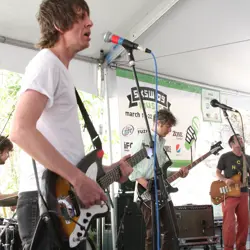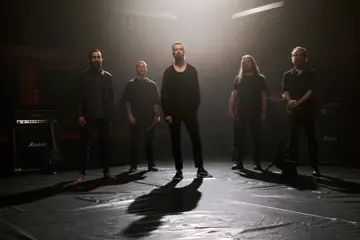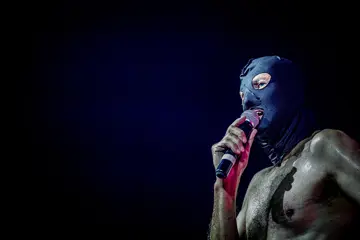 Obits
ObitsBrooklyn garage-rockers Obits are arriving in Australia amidst the wave of Splendour tourists, but they’re not playing the festival. In fact, their two trips here haven’t involved any outdoor performances: a rarity in this era during which most overseas acts build tours around festival dates. If Obits’ raucous LPs – 2009’s I Blame You, 2011’s Moody, Standard And Poor and 2013’s Bed And Bugs – sound like the work of a band who’d much prefer playing dive bars, that’s because they are.
“If we were the kind of band who just did the festival circuit, I don’t think we’d be happy,” says guitarist Sohrab Habibion. “Those huge festivals are like going to the mall: they’re these vast, corporate, sponsored spaces that try and please everyone but end up pleasing no one. It’s a spectacle, it’s Roman, it’s the death of music. For me, music is an intensely personal experience, and it’s best savoured that way. A sweaty room with 200 people, in which everyone can share in it, that’s what speaks to me.”
If Habibion talks of rock’n’roll with reverence, it’s because he still remembers how it saved him from an unhappy childhood. Born in the US to an Iranian father and an American mother, Habibion’s early years were split between New York and Iran, before the 1979 Iranian revolution lead them to permanently settle in Washington, DC. With the Iranian hostage crisis spanning the next two years, they were dark days for the family. “The racism was very direct: my dad had a PhD in economics and he couldn’t get a job – he literally had to work selling carpets,” Habibion explains. “My mom wasn’t even an Iranian, but she’d taken my father’s name, so even she encountered this blatant prejudice. I remember seeing T-shirts with Mickey Mouse on them, flipping the bird, saying, ‘Fuck Iran’. It was a hostile climate, and it definitely cemented my love of the outsider, anyone who feels like they don’t belong in mainstream culture.”
In 1980s DC, this naturally lead Habibion to the city’s staunch hardcore scene. “You didn’t have to be anything to be a part of it,” Habibion remembers, “you could just be who you were. It was such a welcoming environment for me, at a time when nowhere else was welcoming. And the bands from DC at the time were great: their lyrics were interesting and thoughtful and provocative, and there was a passion for both local and global politics.”
Don't miss a beat with our FREE daily newsletter
At first, Habibion – a student of clarinet and saxophone – was just a fan, but that changed when his mother won a guitar at a school auction. “That instrument had such a direct connection to the music I was listening to,” he says. “I liked Benny Goodman and Artie Shaw well enough, but there was no clarinet in a Minor Threat song.”
After tapping into the “primal expression” of playing in a (now-forgotten) teenage hardcore band, Habibion founded the post-hardcore outfit Edsel in 1988, serving as songwriter for five LPs issued through the early-to-mid-’90s. After the band “trailed away”, Habibion stopped playing in bands all together. But fate intervened when old friend Rick Froberg – one-time frontman of infamous post-hardcore outfit Drive Like Jehu – moved to New York. The pair started playing music together in 2006.
"I remember seeing T-shirts with Mickey Mouse on them, flipping the bird, saying, ‘Fuck Iran’."
“When I met my now-wife, I wasn’t making music at all and she thought it was something from my past,” Habibion says, of that lengthy between-bands break. “Then, when me and Rick started to play together, and I was like, ‘Yeah, I think we’re gonna get a practice-space together and start a band.’ She was totally surprised; She thought we had just been hanging out and drinking beer.”
Froberg and Habibion had, truthfully, formed Obits as a kind of social club; it took them ’til 2008 to play their first live show. But given the pair’s past bands, that first show was bootlegged and uploaded, and Obits immediately found both a following and a record label. “We didn’t have any ambitions when we started, we just played together twice a week because it was fun,” Habibion says. “Everything we’ve done – that we have three albums on Sub Pop, that we’re getting to go to Australia for a second time – has been a total thrill. We all relish it, because we’re not taking any of this for granted. Getting to travel places, meet people, play shows in other countries – we have fun doing what we do. It’s not a lucrative endeavour, so we really and truly live for the people involved, and the satisfaction of our own indulgences. There’s a lot of bands out there, we feel lucky that people give a shit.”















